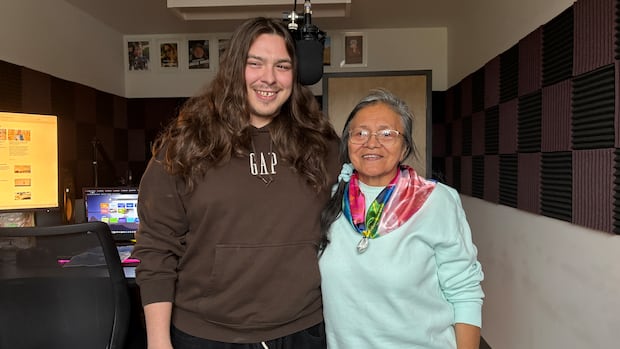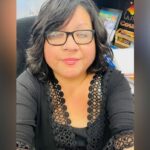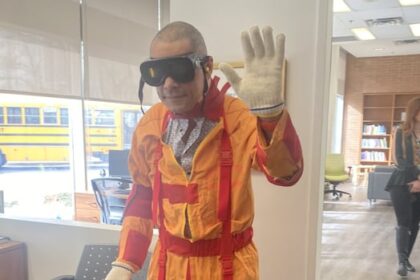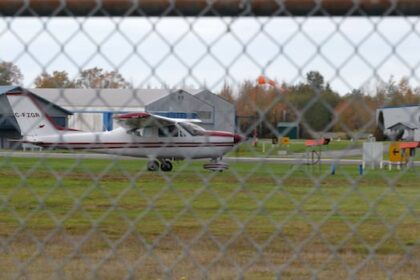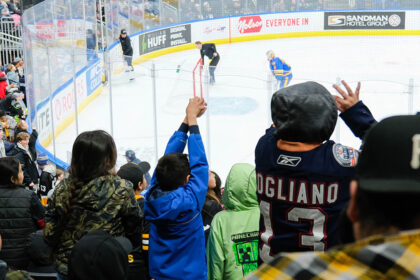NorthŁı́ı́dlı̨ı̨ Kų́ę́ First Nation First Nation’s radio host Teagan Hardisty says hosting a Dene language program with his grandma helps them promote language learning in the community and that in the process, he is learning his language too.Transmitting the language brings ‘a lot of laughter,’ says host Gamma BettyAvery Zingel · CBC News · Posted: Oct 24, 2025 6:00 AM EDT | Last Updated: 7 hours agoListen to this articleEstimated 3 minutesTeagan and Elizabeth Hardisty host an hour of Dene language radio programming every day. (Avery Zingel/CBC)The saxophone solo from Gerry Rafferty’s 1978 hit song Baker Street rings across the airwaves of Łı́ı́dlı̨ı̨ Kų́ę́ First Nation’s FM station as Teagan Hardisty and his grandmother try to answer the age-old question: is there a Dene Zhatıé word for saxophone?Elizabeth Hardisty, who goes by the radio moniker Gamma Betty, takes her grandson through the syllables. They repeat words back to each other until Teagan gets the word spot on.For the last year and a half, Teagan and his grandma have been broadcasting every day for an hour in English and Dene Zhatıé. In that process, Teagan said he’s slowly picking up phrases from his grandma, a seasoned Dene language interpreter.“It really started just having overall conversations with my grandma, just to have her around more. This is a great way to have her around and spread the word in the community. It’s really fun.”Elizabeth Hardisty, who goes by the radio moniker Gamma Betty, is teaching her grandson Teagan Dene Zhatıé through their radio show together. (Avery Zingel/CBC )They run community announcements, and introduce each song in Dene.“The song that’s playing now is Barracuda. How do you say barracuda?” says Teagan.Elizabeth breaks down the meaning which requires multiple words to describe “big fish with sharp teeth.”Laughter fills the radio studio. Part of their language program sometimes involves developing terminology.“When you start sharing in the language, there’s a lot of laughter. It’s only one hour, but I enjoy coming here,” said Elizabeth. Elizabeth Hardisty says spending time with her grandson brings a lot of joy. (Avery Zingel/CBC)Hardisty, 24, said he got involved with the First Nation’s radio station right out of high school and it helped him find his way in the world.Teagan got into radio when he was a “young punk.” Now, he jokes, he’s a slightly older punk and is very involved in his community.Understanding elders and their stories is one of his goals.“It started off with how all we young folks do,” said Teagan.”You ask your grandparents, how do you curse in Dene Zhatıé? You know fun words, like calling people stinker or something. Then, it evolved into wanting to learn more things.”“Elvis of the North” Ernest Monias, adorns the door of CFLK Radio 90.7, where Teagan’s co-worker at LKFN, Sharon Mandeville, secured funding to promote the language. The iconic Monias regularly performs across the North’s Indigenous communities. (Avery Zingel/CBC)Teagan’s Dene Zhatıé dictionary is overflowing with post-it notes to easily locate terms, and it’s marked up and down with modifications penned by his grandma. These changes are specific to local dialects, he said.Teagan said he wants to teach language to his friends and family and tries to incorporate it into daily life with his peers. He said listening to fluent Dene speakers is a bit like filling in the blanks. He said his goal is to be able to understand them well, and that broadcasting in the language has brought him a greater appreciation of the community.Elizabeth said running the daily program with her grandson brightens her day. Friends around town say “we heard you on the radio, Gamma Betty,” she said.Watching her grandson learn is encouraging because it means the young people are picking it back up, she said.Elizabeth said residential schools tried to take away their language. She enjoys transmitting the language to her grandson and says this fun daily language practice builds a person’s fluency, similar to the mentor-apprentice program model.“His vocabulary is building. That’s really good to see that. My generation, we’re trying to pass on our language to the future generation. It’s happening right before my eyes.”ABOUT THE AUTHORAvery Zingel is a reporter with CBC North in Yellowknife. Email Avery at avery.zingel@cbc.ca.
Wednesday, 4 Feb 2026
Canada – The Illusion
Search
Have an existing account?
Sign In
© 2022 Foxiz News Network. Ruby Design Company. All Rights Reserved.
You May also Like
- More News:
- history
- Standing Bear Network
- John Gonzalez
- ᐊᔭᐦᑊ ayahp — It happened
- Creation
- Beneath the Water
- Olympic gold medal
- Jim Thorpe
- type O blood
- the bringer of life
- Raven
- Wás’agi
- NoiseCat
- 'Sugarcane'
- The rivers still sing
- ᑲᓂᐸᐏᐟ ᒪᐢᑿ
- ᐅᑳᐤ okâw — We remember
- ᐊᓂᓈᐯᐃᐧᐣ aninâpêwin — Truth
- This is what it means to be human.
- Nokoma


